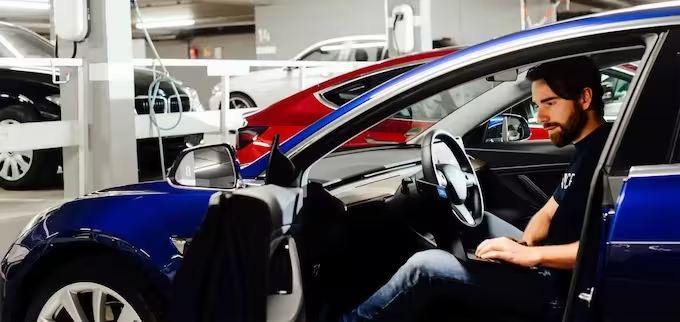The Munich-based startup TWAICE cooperates with the Institute of Automotive Technology at the Technical University of Munich in the research project bawaii to improve predictive battery analytics with the application of artificial intelligence.

Research Cooperation bawaii
With artificial intelligence towards better battery understanding
Munich-based startup TWAICE cooperates with the Institute of Automotive Technology at the Technical University of Munich in the research project bawaii to improve predictive battery analytics with the application of artificial intelligence.
Already at 70 to 80 percent of its capacity, the battery in electric cars needs to be replaced to ensure reliable operation. However, the condition and the remaining lifespan can to date not yet be determined precisely, often making the operation of electric cars inefficient and expensive. The Munich-based startup TWAICE has developed software that will change that. With the help of digital twins, the program provides precise information about the "health status" of a lithium-ion battery.
The industry is very interested in this: car manufacturers want to use the software as well as energy companies and insurance companies. In advancing their innovative approach, the founders of TWAICE are now working closely together with the Technical University of Munich (TUM). This cooperation between research and industry is under the project name bawaii (Battery Analytics with Artificial Intelligence). It opens a way for the latest academic research on artificial intelligence to be put to practical use.
Researchers at the TUM Institute of Automotive Technology (FTM) have been using artificial intelligence for a while to make e-vehicles cheaper, give them more range and bring new models to the market quicker. The research group works on batteries, the most valuable and important part of an electric car. TWAICE continues to use the same approach for practical applications outside university. The startup was launched a year ago as a spin-off from TUM. Meanwhile, some industrial corporations are already among the customers. They want to use the TWAICE software to run their batteries more efficiently.
TWAICE was founded by Michael Baumann and Stephan Rohr. The two engineers have long been concerned with the question of how to determine the health of modern batteries reliably. They use sophisticated software to observe the processes in expensive energy storage systems. From this, the developers can derive predictions on the condition and life of the battery. These factors depend on the individual stress that must be recorded during operation by constant measurement data.
The government-sponsored project bawaii is intended to provide further opportunities for meaningful analyses of the large amounts of data generated when operating a battery. The TUM researchers at the institute of Professor Markus Lienkamp have a far-reaching competence with regard to the behavior of lithium-ion batteries. They use special modeling and simulations for their investigations. The institute has numerous test benches and demonstrators where researchers can verify their calculations. Part of the task sharing is that TUM explores new methods and validates existing ones, while their partners from TWAICE deliver the underlying AI software and take on the testing of the newly developed method in real vehicles.
Vehicle manufacturers can use TWAICE software to precisely validate how well their battery system meets their needs. And they receive accurate predictions for the aging of the battery right from the development stage. This can then be designed accordingly. The potential savings can be huge because so far, the energy storages are often planned too big. Up to half of the cost of an e-car is in the battery. How profitable such a vehicle is at the end depends crucially on how well its battery can be utilized. The bawaii project will increase the benefit through the targeted use of artificial intelligence.

See TWAICE Energy Storage Analytics in Action
Sign up for the next live group demo and learn how TWAICE can transform your BESS operations. In just 30 minutes, you’ll get a demo of key features and use cases, and engage with our product experts for a live Q&A.
Related Resources

Second Foundation Pioneers Data-Driven Operation with Three-Year Deal for BESS Analytics
.avif)
TWAICE and Modo Energy Debut Integration to Quantify the Financial Impact of BESS Performance Improvements in ERCOT Markets
%20(1)%20(1)%20(1).avif)








%201%20(5).avif)






.avif)

.avif)
